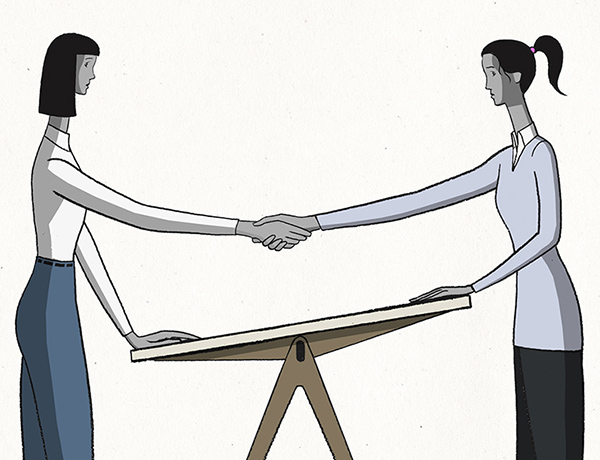Negotiating for a Grade
In McIntire class, students weigh both sides of outcome

With eight issues on the table, the revitalization of a downtrodden warehouse district is on the line. At the Virginian, or perhaps at Bodo’s, or maybe on a couple rocking chairs on the Lawn, 15 pairs of fourth-years dig in for one-on-one negotiations.
In each pair, one student represents the real estate developer, the other the city. Each goes after what’s important; for the developer, the height of new buildings, financing and the number of condos carry the most weight. The city’s representative is also concerned with the height of the buildings but prioritizes the use of local subcontractors and the number of units for low-income families.
After the class debriefs, Professor Lucien Bass (Engr ’63, Darden ’65) uses a points system to assess who got the best of the negotiations. The former senior director of international development at R.J. Reynolds Tobacco Co. has been teaching Negotiating for Value for 17 years.
Unbeknownst to them, the students on opposite sides of the table had been given several of the same priorities—a detail that a grinning Bass reveals midway through the debriefing.
It all makes for one big game of poker—which, according to Bass, is often what a negotiation can become.
But Bass tells the students that there is a fine line between using good tactics and downright deception. This comes into play in negotiating over a building inspector. Both sides want the same person, but don’t know their counterpart’s preference. In negotiation, one student acted as though he was making a concession on inspectors, angling to get something in return. “You’ve got to be careful,” Bass says. “You just don’t lie in a negotiation—it will put a black cloud over you for the rest of your life.”
In determining the winners and losers from the case study, Bass uses the Dual Concern Model, which weighs how much each party gained versus how much it gave up.
Bass asks a student who just a few minutes earlier had expressed confidence that she had struck a fair deal, how she was feeling. “Now, looking at the chart, not so great,” she says.
Bass goes on to warn students of potential cross-cultural dangers within a negotiation. A turn of phrase that may seem innocent can be misinterpreted. To this point, one class assignment is to watch Rising Sun—a movie based on a Michael Crichton novel that centers around the differences in Japanese and Western business strategies and corporate cultures.
“Professor Bass has emphasized that negotiations aren’t necessarily a one-time thing—they’re long term,” says Richard Schweiker (Com ’18), “and that building relationships is almost more important than winning out at one point. I’ve kind of realized I should be a little more open.”
“I realized I may be a little too nice,” Maria Reyes-Chian (Com ’18) says with a laugh. “One thing Professor Bass talked about is the need to really claim value on your side.”
It raises a question: How much of negotiating is intuitive and how much can be taught?
“The whole thing about negotiations is that you and I and anybody in the class are who we are,” Bass says. “What we are is what we take to whatever the negotiation is. You can take a role, but you can’t take you out of the mix. What you bring to the table [as yourself] is what will be in that negotiation.”